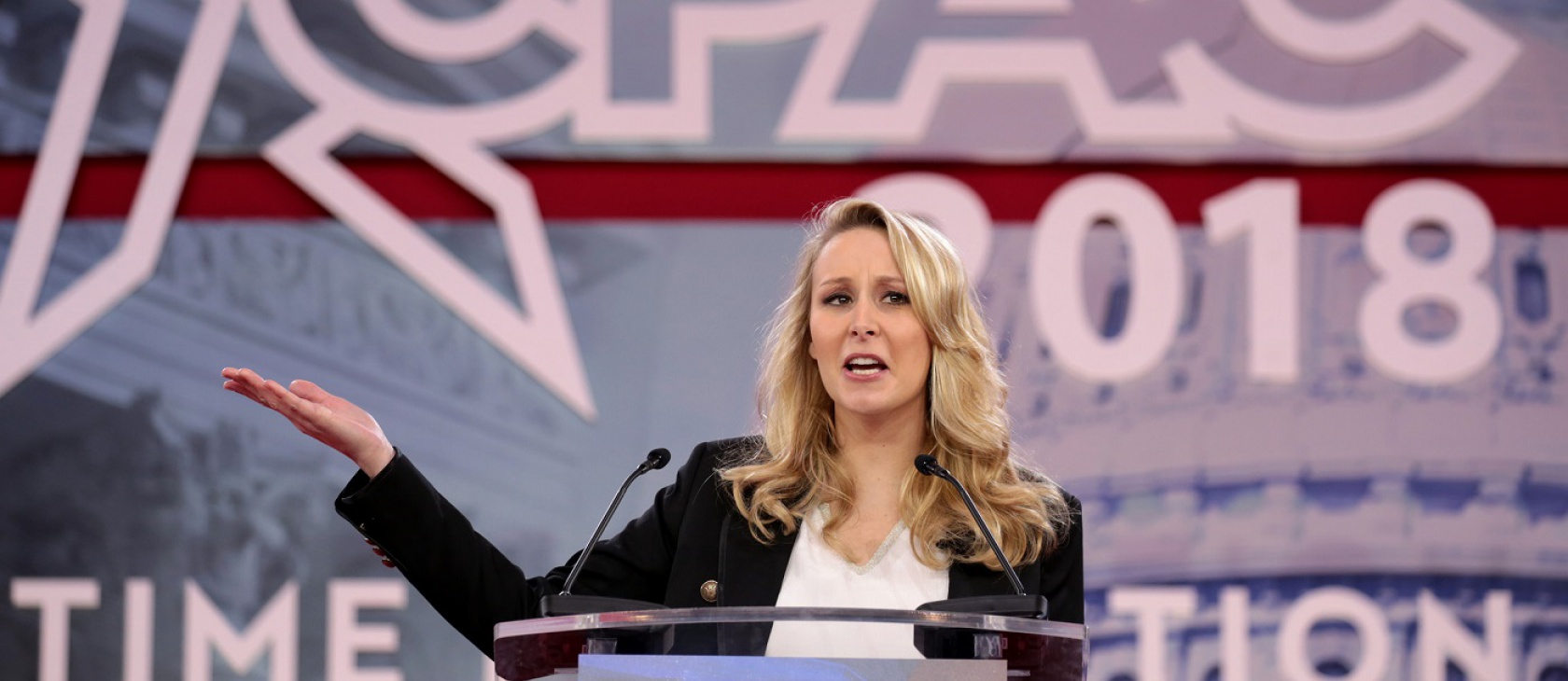It is no secret that conservatism has been suffering an identity crisis since at least the end of the Cold War. But inviting French National Front member Marion Maréchal-Le Pen to address CPAC has stirred debate over another political label: classical liberal.
CPAC attendees gave her a positive reception on Thursday, responding with emotion when she said France is transforming “from the eldest daughter of the Catholic Church to the little niece of Islam.”
“This is not the France that our grandparents fought for,” she said.
The reference to grandparents was unfortunate. Her grandfather, Jean-Marie Le Pen, founded the National Front (FN) in 1972 with the support of traditionalist Catholics – as well as Vichy apologists, Holocaust deniers, and open fascists. In 2012, at age 22, Marion became the youngest person elected to the National Assembly in the past two centuries, as an FN member. Her aunt, Marine Le Pen, eventually elbowed Jean-Marie (Marine's own father) aside to take the reins of the party, making it to the run-off of the 2017 French presidential election before losing to Emmanuel Macron.
Marine distanced the party from père Le Pen by toning down its overt racism, emphasizing its economic interventionism, and entirely jettisoning its Catholic self-image. Yet FN’s history, and Marion’s own positions, made many question (and some virulently denounce) her invitation. CPAC responded by saying that, unlike her aunt, Marion “stands for classical liberalism (i.e., conservatism).”
Marion and Marine Le Pen have clashed, publicly and privately, over the direction of National Front. But Marion Le Pen is no champion of classical liberalism.
Exhibit A is her CPAC speech itself. Eamonn Butler, who literally wrote the book on the subject of classical liberalism, explained that its adherents believe “too many nations try to protect their own producers with import quotas and tariffs.”
Yet in her CPAC speech, Marion Maréchal-Le Pen denounced free trade alongside eugenics, euthanasia, and transhumanism. Eliminating trade barriers “creates slaves in developing nations,” she said. The most recent National Front platform calls for “intelligent protectionist measures” to shield domestic industries from “unfair foreign competition.”
On economics Marion is to the right of her aunt – but so too, arguably, is Emmanuel Macron. The FN’s fiscal policy, accepted by both Le Pens, sees “the State acting as the strategist” in industry and finance, and promises “to guarantee the welfare state.”
Marion Maréchal-Le Pen promised a total of €40.2 million ($49.5 million U.S.) a year in new government spending in 2015. The only discernible cut she proposed was axing €200,000 for family planning, according to the French free market think tank, Fondation iFRAP. Le Pen’s brand of social conservatism easily supports pro-natalist economic policies like reinstating the universal family allowance.
“It’s true that Marion comes from the traditionalist Catholic wing of the National Front, and displays little enthusiasm for the far-left economics espoused by her aunt, Marine, the current leader,” wrote Daniel Hannan on Monday. But the result is not classical liberalism, a concept best likened to modern-day libertarianism.
Marion proudly proclaimed herself “the political heir of Jean-Marie Le Pen” last April, adding that she disagreed with his (repeated) comments downplaying the Holocaust. Filial loyalty notwithstanding, one would hope a classical liberal would offer a more robust denunciation of her party’s illiberalism … if she has one to make.
“Marion is a far-right nationalist like her grandfather, and it’s precisely because Marine tried to distance the party from the toxic image of Jean-Marie, to become more mainstream and attract working-class voters, that she opposed her,” said Ben Haddad of the Hudson Institute.
That means dissenting from Aunt Marine’s icy secularism and most pronounced economic interventionism. Marine so championed French secularism (laïcité) that she was willing to banish the crucifix and the kippah from all public places, as long as the burqa followed in tow. Marion has called on French civic and cultural leaders to end their “self-flagellation” and acknowledge France’s “Christian roots.”
But it also means a closer relationship with the uglier parts of the party’s domestic constituency. For instance, last year she dropped in on an event run by the Identitarian movement – an ethnic identity movement one political scientist placed between the National Front and full-blown neo-Nazism – allegedly to meet friends. Two years earlier, she spoke of the National Front creating a “union of the Right,” including Identitarians from Génération Identitaire (some of whom ran for office with FN, others worked on her staff).
Conservatives would do well to follow Mark Tooleys advice to be wary. Daniel Hannan tweeted more tersely:
American conservatives should have nothing to do with the Le Pens. https://t.co/xyr4nAGORf
— Daniel Hannan (@DanielJHannan) February 26, 2018
There is a vast gulf between the ideology of any Le Pen and the classical liberalism of Bastiat or Tocqueville. She made an heartfelt plea for religious expression and socially conservative values – e.g., that people should not be free to purchase designer children “in a catalogue.” But Marion Maréchal-Le Pen needs a greater appreciation for the ways the free market protects human dignity – and how the miasma of identity politics distorts it.
(Photo credit: Gage Skidmore. This photo has been cropped. CC BY-SA 2.0.)




